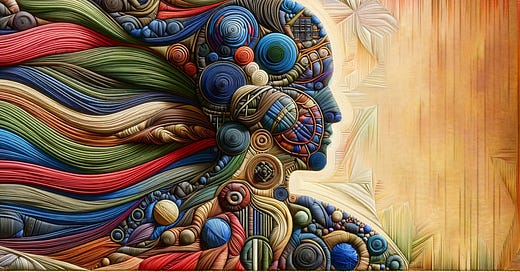Perspective Binds the World We Live in By Hiding the Process of its Creation
We think we're creating when really we're experiencing the created.
Stories or narratives are how we bind individual perception and social reality. Social reality, the combined stories that we then call family, culture, and civilization, is a universe of perspective. Consider from a nautical metaphor, where stories are the lines connecting individual boats with the pier of social reality. Sure, the boat exists but until it gets close enough to dock, the details of its make are uncertain and the quality of its captain is unclear. Without the sharing of stories, nobody would have access to the inner worlds of others. Further, without them, the substance of who we are would be dismally small, cut off from the expanding presence of so many other perspectives. A dock without boats is a sad and empty place.
Now, 'stories' are the narrative version of what is built out of our senses. Importantly, however, we have no access, consciously, to just how those senses work. The interpretation, and therefore the initial separation of knowing between broader reality and the individual, has already occurred when we have our thoughts and emotional experiences. Think of a rock or tree. When they become 'the rock struck me' or 'the tree fell over,' we're giving a structure to experience, providing ourselves an order to what otherwise would be a haphazard array of individual sensory data points. It happens so seamlessly, attempting to think of experience as anything else is almost impossible. To help, consider a cartoon animation. There are many individual poses, incrementally streamed together into what we then see as movement. Much the same occurs in our brains and when we mentalize it consciously through language, we get stories.
Perspective - Weaving the World Together
This process of binding disparate pieces of reality to build the structure of our experience is why it's so difficult to question our opinions. It's also why when our worldview is confronted, we often feel threatened or under attack. Perspective isn't merely something we have, it's the fundamental ground upon which we interact in and with the world. Coming back to the nautical metaphor, it'd be like someone removing and inspecting pieces of the hull from your boat as you come in to dock. Similar occurs when we question ourselves, ripping the floorboards out and letting in water. Talk about scary!
The binding process is automatic and unconscious for the vast majority of us in the majority of our lives. Ponder for a moment just where your thoughts come from, they arise without consideration fully formed and connected. Even attempting to think about your thinking requires the same process for those same thoughts are arising just as fully formed as the ones you're attempting to contemplate! This can be amusing, but also frustrating and, when we police our thoughts from a desire to control them, is completely futile.
When working with clients/patients, one question I often ask when confronted with the frustrations of being caught up in thoughts and emotional assessments, is to ponder what the selection process was. Did you stop and select out of a mental buffet of potential next experiences what you “wanted”? Even the thought experiment itself highlights the absurdity of judging our conscious lives, as the process of selection is itself its own set of thoughts you didn’t choose!
This is where meditation practices can be helpful, not for control, but for being more aware of how our thoughts come into being at any given moment. Being 'caught up' in a thought/feeling is to fall victim to the notion that a singular story encompasses the whole of your experience. Meditation helps us identify the 'thinker behind the thinking' and recognize how much broader our potential is than any single thought/feeling can hold.
Reliance on the Personal
As we recognize no single story can hold the entirety of reality, rather serving as a cognitive heuristic through mechanisms like confirmation bias, so it becomes easy to see how no single story can hold every facet of what another person’s potential perspective is either. I'm reminded of the movie "Stargate" (there will come a time when this reference will be too old, or perhaps already is, and I’ll feel quite sad at the cultural loss of the brilliant James Spader) where movement through different galaxies is explained. You need six points of reference to identify a destination, but you also need a place of origin. That origin is individual perspective and the destination is the story cobbled together from several points within experience.
With such an image in mind and the power of interstellar travel firmly in our imagination, it is little wonder we all rely so heavily on personal stories or 'anecdotes' to structure what we believe to be true about ourselves and the world.
Importantly, "anecdotal evidence" does not simply mean "my own personal experience." There is a causal connection being made between perception and what the world is or is supposed to be. Going back to "Stargate", we don't select disparate points haphazardly, but with the bedrock belief that in doing so we are defining a particular location in the universe. In other words, within the world of personal belief, there exists in the space between perspective and destination a sacred connecting line of 'WHAT IS.'
We like our stories to be right, otherwise we wouldn't be telling them, and they certainly feel right because having that feeling means we get to move forward in the world as if we know what's going on. Thankfully, questioning our stories doesn't require us to act as if we're cast adrift in a world without meaning and truth. What it does require of us is a willingness to accept the limits of perspective and to actively engage in that creative process with humility. We may not be traveling amongst the stars, at least not yet, but our universe of perspective will still get a whole lot bigger and provide a greater potential for our lives.
Further Reading:
The Mind Club by Daniel Wegner






